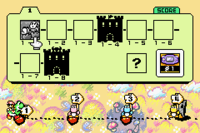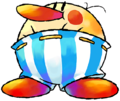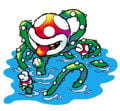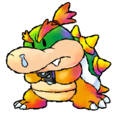Yoshi's Island: Super Mario Advance 3: Difference between revisions
(→List of changes: Do you have a source for this?) |
Tag: Mobile edit |
||
| Line 112: | Line 112: | ||
*In World 6-8: [[King Bowser's Castle (Super Mario World 2: Yoshi's Island)|King Bowser's Castle]], when being chased by [[Tap-Tap the Golden]] in Door 3, the castle boss approach theme is played rather than the castle boss theme itself. | *In World 6-8: [[King Bowser's Castle (Super Mario World 2: Yoshi's Island)|King Bowser's Castle]], when being chased by [[Tap-Tap the Golden]] in Door 3, the castle boss approach theme is played rather than the castle boss theme itself. | ||
Some sound effects were also changed to fit the GBA's more limited capabilities. | Some sound effects were also changed to fit the GBA's more limited capabilities. | ||
*The sound effects for Yoshi's [[jump]]ing, [[Flutter Jump|fluttering]], [[crouch]]ing, pushing large objects, and egg throwing were replaced with vocals similar to those used in ''Yoshi's Story''. Also, the Shy Guy voice clips from that game are used for the Shy Guys as they emerge from pipes, whereas they | *The sound effects for Yoshi's [[jump]]ing, [[Flutter Jump|fluttering]], [[crouch]]ing, pushing large objects, and egg throwing were replaced with vocals similar to those used in ''Yoshi's Story''. Also, the Shy Guy voice clips from that game are used for the Shy Guys as they emerge from pipes, whereas they shared a sound effect with Lantern Ghosts in the original game. | ||
*Baby Mario has a new cry. The original cry can still be heard from [[Baby Luigi]] on the world map. | *Baby Mario has a new cry. The original cry can still be heard from [[Baby Luigi]] on the world map. | ||
*The squeaking sound made when Yoshi walks on icy surfaces has been removed. | *The squeaking sound made when Yoshi walks on icy surfaces has been removed. | ||
Revision as of 15:27, November 26, 2023
| Yoshi's Island: Super Mario Advance 3 | |||||||||||
|---|---|---|---|---|---|---|---|---|---|---|---|
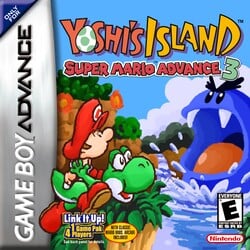 For alternate box art, see the game's gallery. | |||||||||||
| Developer | Nintendo EAD | ||||||||||
| Publisher | Nintendo | ||||||||||
| Platform(s) | Game Boy Advance, Virtual Console (Nintendo 3DS, Wii U), Game Boy Advance - Nintendo Switch Online | ||||||||||
| Release date | Game Boy Advance: Template:ReleaseVirtual Console (3DS) (Ambassador Program Release): Template:ReleaseVirtual Console (Wii U): Template:Release Game Boy Advance - Nintendo Switch Online: Template:Release[?] | ||||||||||
| Language(s) | English (United States) French (France) German Spanish (Spain) Italian Japanese Simplified Chinese | ||||||||||
| Genre | 2D platformer | ||||||||||
| Rating(s) |
| ||||||||||
| Mode(s) | Single player | ||||||||||
| Input | Wii U: Nintendo Switch: Game Boy Advance: Nintendo 3DS:
| ||||||||||
Yoshi's Island: Super Mario Advance 3 (or Super Mario Advance 3: Yoshi's Island) is a reissue of the 1995 SNES game Super Mario World 2: Yoshi's Island for the Game Boy Advance as part of the Super Mario Advance series, as well as the only reissue in the Yoshi's Island series. It was released in 2002 and has a number of differences from the original surrounding gameplay, content, and graphics, as listed below. Aside from that, a remake of the classic Mario Bros. is included as it was in the other Super Mario Advance games. It was the last Yoshi platform game developed by Nintendo.
The game was rereleased on the 3DS's Virtual Console exclusively to the 3DS Ambassadors in Australia on December 15, 2011, and in Japan, North America, and Europe on December 16, 2011. It was later fully released on the Wii U's Virtual Console in North America and Europe on April 24, 2014; Australia on April 25, 2014; and Japan on October 15, 2014; and on the Nintendo Switch's Game Boy Advance - Nintendo Switch Online service on May 26, 2023.
Gameplay
Controls
| Action | Patient | Hasty |
|---|---|---|
| Move | ||
| Jump | ||
| Pound The Ground | ||
| Eat, spit out | ||
| Duck, swallow | ||
| Aim/throw egg | ||
| Lock target reticule | ||
| Look up | ||
| Pause menu | ||
| Current score | ||
List of changes
Yoshi's Island: Super Mario Advance 3 features many changes and differences from the original SNES game. Many of them were made either to account for the GBA's lack of a backlight and button configuration or to modernize the game's appearance.[1]
General changes
Much of the artwork from the original game is retouched to use shading effects to make it look more elaborate. Some images (such as those of Hookbill the Koopa, Baby Bowser, and Kamek) appeared in strategy guides for the original with wrong colors; however, no such mistakes are present in the retouched versions.
The pause menu has been changed. Instead of one menu handling all functions, there are now two.
- A map that allows the player to put their Game Boy Advance into sleep mode, or return to the overworld map.
- A redesigned version of the original's pause screen which allows the use of items, and displays the player's current score for the level.
- The GBA version allows the player to carry up to 27 items at a time, rather than 25 as in the SNES version.
- The Yoshi's Island Mini Battle code was changed (as the Game Boy Advance lacks
and
buttons) to
 ,
,  ,
,  ,
,  ,
,  (while holding the
(while holding the button). The 2-Player option was also removed due to a link cable battle being only featured in the Mario Bros. remake.
- Additionally, the Mini Battle huts are not sealed after a battle in the GBA version, so the hut can be re-entered and the battle fought as many times as the player wishes.
- Yoshi can no longer collect Giant Eggs with his tongue, thus making it impossible to carry them to other stages with a trick from the original release. Yoshi also cannot hit Message Blocks with Yoshi Eggs. This includes Giant Eggs to prevent the screen from glitching.
- The Countdown Timer ticks down each second now, instead of nearly twice per second as in the original game.
Level design changes
Six entirely new levels were added to the remake, called Secret Stages: Exercise in the Skies, Mystery of the Castle?, Go! Go! Morphing!, Fight Toadies w/ Toadies, Items are fun!, and Endless World of Yoshis. These are to the left of the Extra Stages on the map screen, and are unlocked by defeating Baby Bowser on World 6-8. Along with the six new levels, several levels from the original have had things added and/or removed from them:
- A new room has been added to the level 1-8 (Salvo The Slime's Castle). It is between what were the second and third rooms in the original game. It has one Shy-Guy-spawning pipe.
- A flipper has been added in level 2-1 (Visit Koopa And Para-Koopa) after going through the falling stone blocks.
- The original version had 21 red coins in More Monkey Madness (Extra 3) instead of the usual 20. The extra red coin was under a Tap-Tap on a post, which was removed in the remake.
- An extra Middle Ring has been added to 4-4 (Marching Milde's Fort), at the end of the Shark Chomp chase.
- The final room before the boss in 4-8 (Hookbill The Koopa's Castle) has been redesigned.
- An extra Middle Ring has been added to 5-7 (Shifting Platforms Ahead), near the warp pipe leading to the room with the level's first flower.
- All of the Extra Stages in the original game were modified for this version, most noticeably Kamek's Revenge.
- In the first area of 6-8 (King Bowser's Castle), where Yoshi must cross the large gap as a Helicopter, every few seconds, Kamek will speed across the screen, trying to knock Yoshi out of the sky. In the original game, this keeps up until the player enters the door at the far end. In the GBA remake, once the player reaches the Middle Ring near the door, Kamek will fly in, look at Yoshi grimly, then fly off, leaving the player alone thereafter.
Graphical changes
As is typical for GBA remakes, the palette is lightened to compensate for the original Game Boy Advance's lack of a backlight. Several other graphics have been updated beyond a lighter palette, however:
- Button prompts were changed to be in line with the GBA ones.
- In the original, the Yoshi who completed the x-2 levels was a very dark shade of pink. However, they appeared red on the map. Similarly, the Yoshi who completed the x-7 levels was red, but appeared hot pink on the map. In the remake, the x-2 Yoshi is always light pink, and the x-7 Yoshi is always red.
- All Yoshis had red shoes in the original. In the remake, they have different colored shoes, matching that from official artwork and the opening cutscene of the original game.
- In underground levels with "sparkling" ground, mushrooms and other foreground decorations sometimes have their palettes changed. This is done to fix a graphical glitch where some black objects would also sparkle.
- In the original, the coin graphics used for dark areas were also used for red coins disguised as normal coins. As such, the red coin locations could often be given away by the red shadowing around the bottom, whereas normal coins were entirely yellow. In the GBA version, the red shadowed coin graphics are primarily used for dark areas, and while there are still some areas where the red shadowing gives away the red coin locations, the hidden red coins are largely indistinguishable without the use of the magnifying glass.
- When Yoshi touches a Fuzzy in the original game, the background smears erratically and fades between random colors. The ground also ripples. In the remake, the background doesn't smear or tint. However, it does fade between white and its normal colors. The ground ripple is also less fluid in the remake, and is now done by the game itself. This probably happens because the Game Boy Advance is not able to handle the Super FX chip-powered graphic effects as well as the original, while also preventing any risk of seizures the original could have imposed.
- Sealed and locked doors use slightly different versions of their sprites, in which the gap between the double-doors doesn't cross over the keyhole or wooden boards. These sprites are earlier versions of the ones used in the SNES version, and can be found, unused, in its code.[2]
- Kamek's magic has a different visual effect. The colored cloud is absent, while the cycling sparkles remain.
- When a level is completed, a new "World Total Score" screen is displayed (which keeps track of the highest score done by the player) after the "Level Score" screen. It also shows messages when the player unlocks the Bonus Challenge for the current world and the Extra Stage.
- The overworld map was redesigned for this remake, to accommodate the GBA's screen size and technical capabilities.
- The path the Yoshis follow to their goal is now in a straight line (due the GBA screen size limitation), and spots have been added to the map for each world's two hidden levels.
- A "world select" screen was added, and if the player has not yet completed World 6-8, Baby Luigi is shown on World 6's spot on the world select map. He is seen in a bubble, crying, much like Mario when he is knocked off Yoshi's back.
- The thumbnail for extra stages in the international release changes the "E" in "extra" from uppercase to lowercase. However, while an uppercase and lowercase "X" look identical apart from size, the "T," "R," and "A" are not changed, resulting in the thumbnail appearing to read "exTRA."
- On the overworld map screen of the SNES version, two "?" boxes are seen between the castle stage's icon and the score icon, these being for the world's Extra Stage and Bonus Challenge, respectively. In the GBA version, there is only one "?" box next to the control style icon, for the Bonus Challenge.
- There is a large empty space between the Bonus Challenge and the castle icon, with no indications of the secret or extra stages prior to them being unlocked.
- In the SNES version's overworld map screen, the scores can be toggled by an icon just to the left of the control style icon. In the GBA version, the score toggle is a tab above the stage select box, next to the world tabs.
- Baby Bowser has four fingers instead of three during the final battle, matching his adult self and later appearances starting with Yoshi's Story.
- Upon defeating the final boss, the respective file on the file-select screen will now display the word CLEAR with an image of Baby Bowser. Previously, a file with 6-8 completed would retain the WORLD 6 text with the image of Kamek.
Sound changes
The game's soundtracks were downgraded, trimmed, and/or replaced to match the sound capabilities of the Game Boy Advance.
- The full length opening of the World x-8 boss music plays for all the big bosses, rather than for just the Naval Piranha and Raphael the Raven.
- When Tap-Tap the Red Nose is defeated, the mid-boss theme continues playing until he sinks to the bottom of the lava pit, rather than stopping as soon as he falls in.
- In World 5-1: BLIZZARD!!! the sky bonus area continues playing the main level theme rather than the song heard during Bonus Challenges.
- In World 6-8: King Bowser's Castle, when being chased by Tap-Tap the Golden in Door 3, the castle boss approach theme is played rather than the castle boss theme itself.
Some sound effects were also changed to fit the GBA's more limited capabilities.
- The sound effects for Yoshi's jumping, fluttering, crouching, pushing large objects, and egg throwing were replaced with vocals similar to those used in Yoshi's Story. Also, the Shy Guy voice clips from that game are used for the Shy Guys as they emerge from pipes, whereas they shared a sound effect with Lantern Ghosts in the original game.
- Baby Mario has a new cry. The original cry can still be heard from Baby Luigi on the world map.
- The squeaking sound made when Yoshi walks on icy surfaces has been removed.
- The water gurgling sound effect in the background of sewer areas has been removed.
Textual changes
In all regions, the font used is the thicker one (used in the European version and the later American re-release in the original) instead of the thinner font (in the Japanese and American SNES games). Besides the font being updated, much of the wording has changed throughout the game's dialog. Notable examples include:
- In the opening cinematic, the story in the SNES version starts with "A long, long time ago... This is a story about baby Mario and Yoshi..." The GBA version starts out with "This is a story about Baby Mario and Yoshi... A story that took place a long, long time ago." Also, the story states that in the stork's bill, he "supports a pair of twins" in the SNES version, while the GBA version states that he "carries a pair of brothers." The narrator also says "WHOA!!!" instead of "WOW!!!"
- Most, if not all of the hint boxes have at least some changes in their messages. One of the more significantly changed hint boxes is in a secret room in World 3-2, which says in the SNES version, "We, the Mario team poured our hearts and souls into creating this game for your entertainment. It is full of secrets. Enjoy!" and in the GBA version, "How do you like this game? Goodies are hidden in every level, you know. You should look all over if you want to get 100 points! Investigate anything that looks suspicious."
- The sixth Extra Stage of the game had its name changed from "Castles - Masterpiece Set" to "Ultimate Castle Challenge".
- At the World 3-8 boss, when Kamek appears, he says in the SNES version, "Give it up, Yoshi, you cutie without a navel! Ooopp- forget it..." whereas in the GBA version, he says "Give up, Yoshi, you egg-throwing maniac! Ooops... Forget that!"
- When entering Bowser's room, Kamek says "YOU! are n-n-not welcome HERE!!! Yoshi, please hand OVER THE BABY!" in the original, and "Welcome!!! Yoshi, if you would be so kind, please HAND OVER THE BABY!" in the remake.
The GBA version's credits are shorter than the original, and list different staff members.
- As this is a remake, the credits list "Original YI Staff" under "Special Thanks", though very few of the SNES version's staff members actually contributed to the remake.
- As Hiroshi Yamauchi resigned from the presidency of Nintendo a few months prior to the GBA version's release, the remake's executive producer is his successor, Satoru Iwata.
- Shigeru Miyamoto is not credited in the remake; Takashi Tezuka, one of the original game's directors, assumed producer duties in his stead.
Reception
The game received generally positive reviews.
| Reviews | |||
|---|---|---|---|
| Release | Reviewer, Publication | Score | Comment |
| Game Boy Advance | Bryn "hardcore_pawn" Williams, Gamespy | 90/100 | "Overall, Yoshi's Island is a fantastic piece of video gaming entertainment, and although it's an oldie, it's fair to assume that a lot of today's gamers may have missed out on it first time around. 2D enthusiasts should be stoked at getting something this cool on the GBA." |
| Game Boy Advance | Greg Kasavin, GameSpot | 9.2/10 | "Simply put, Yoshi's Island would make an excellent addition to anyone's collection of Game Boy Advance games. Its beautiful, inspired visuals and consistently fun and inventive gameplay make a landmark achievement in one of gaming's most beloved genres, and even though its star isn't Nintendo's famous plumber, the game itself is every bit as good if not better than any other Mario title to date. Besides being a superb game on its own merits and even by today's high standards, Yoshi's Island is also a great little game to have on the go. So even if you've played it before, and especially if you haven't, you should seriously consider picking it up." |
| Wii U | Martin Watts, Nintendo Life | 9/10 | "With its deep exploration-based gameplay and gorgeous art style, Yoshi's Island is still a joy to play all these years later. This particular version may have been originally intended for a small portable system, but Nintendo has done it justice in transitioning it over to Wii U. There are a few minor niggles in terms of performance, although these are more to do with the game’s original porting to GBA, while the Wii U's screen-smoothing feature really helps to keep its visual presentation intact. Moreover, Yoshi's Island is a 2D platformer with a considerable amount of depth; exploring is made fun thanks to Yoshi's egg-based abilities, and it’s also a very challenging experience overall – getting everything is a gargantuan effort, but an immensely entertaining one at that. This is one of Nintendo’s finest efforts from back in the day, and if you've never played it before (or have a hankering to go through it all again), then this is an opportunity you definitely shouldn't pass up on." |
| Aggregators | |||
| Compiler | Platform / Score | ||
| Metacritic | 91 | ||
| GameRankings | 89.55% | ||
Sales
It sold 1.6 million copies in the US and was re-released in 2006 as a Player's Choice title.
Staff
- Main article: List of Yoshi's Island: Super Mario Advance 3 staff
Gallery
- For this subject's image gallery, see Gallery:Yoshi's Island: Super Mario Advance 3.
Yoshi and Baby Mario
Media
Names in other languages
| Language | Name | Meaning | Notes |
|---|---|---|---|
| Chinese (simplified) | 耀西岛 (iQue)[?] Yàoxī Dǎo |
Yoshi Island | |
| Chinese (traditional) | 超級瑪利歐ADVANCE 3[?] Chāojí Mǎlì'ōu ADVANCE 3 |
Super Mario Advance 3 |
References
- ^ Super Mario World 2: Yoshi's Island SNES/GBA Changes Guide on GameFAQs
- ^ Super Mario World 2: Yoshi's Island. The Cutting Room Floor. Retrieved November 2, 2023.
